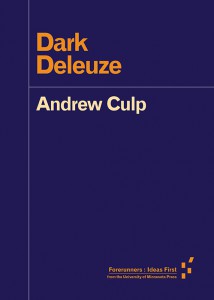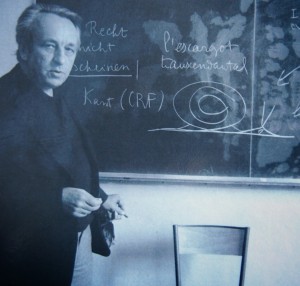I'm pleased to announce that I'll be a Visiting Professor in the Department of Visual and Environmental Studies at Harvard University for Fall 2016. I'll be teaching an undergrad course on the "Digital Image," and a grad seminar titled "The Nonhuman: Aesthetics and Politics of Personhood." I look forward to working with the students and faculty in Cambridge, and will return to NYU in Spring 2017.
Being Is a Computational Mode
An experiment: Let's take the Principle of Sufficient Reason extremely literally. A common but unfortunate way of understanding the principle is to turn it into an explanatory narrative for how things were made or where they came from. “For any entity, there is a narrative that will explain why it exists and why it exists in this manner.”
Such an interpretation confuses the principle of sufficient reason and limits its utility. It reduces facticity to causality. It reduces givenness to a lurid narrative of origins. It shackles appearance to logic.
To avoid such an interpretation, the principle should be taken literally, that is, in terms of the co-presence of being and thought. “No actual entity, then no reason” (Whitehead). Being in the world requires thought in the world. Being-given requires thought-given. An entity requires a reason. To be with means to think with. Thus to follow the path of being also means to follow the path of co-thought, or com-putation. Continue reading
In Lüneberg
I've just begun a six week residency at MECS (Media Cultures of Computer Simulation) in Lüneburg, Germany. They have a series of talks and workshops scheduled including their annual conference on agent-based modeling, and I'll also be making side trips to a conference at the University of Konstanz and the European SLSA conference in Stockholm. I'm looking forward to making new connections and renewing old acquaintances while in Germany.
Dark Deleuze
 In recent years the name “Deleuze” has come to mean vitality, connectivity, affect, intensity, deterritorialization, machinic creativity, and, above all, compulsory positivity and obligatory joyfulness. In his new book, Andrew Culp returns to a different Deleuze, a dark Deleuze more intent on destroying worlds than creating them, more interested in cruelty than joy, more inspired by communism than democracy. It's one of the best texts on Deleuze I've read in quite some time -- highly recommended!
In recent years the name “Deleuze” has come to mean vitality, connectivity, affect, intensity, deterritorialization, machinic creativity, and, above all, compulsory positivity and obligatory joyfulness. In his new book, Andrew Culp returns to a different Deleuze, a dark Deleuze more intent on destroying worlds than creating them, more interested in cruelty than joy, more inspired by communism than democracy. It's one of the best texts on Deleuze I've read in quite some time -- highly recommended!
Is Badiou a Digital Philosopher?
tl;dr the answer is: 0, 0, 1, 0, and 1. (That's no, no, yes, no, and yes.)
As with many questions of this nature -- where both the vocabulary and the material are subject to interpretation -- the answer depends a great deal on how one defines “digital” and how one reads Badiou's corpus vis-a-vis that definition. So let's look at a number of different ways to answer the question.
1) Is Badiou a philosopher of the digital? If we take a naive definition of the digital as “the tools and technologies of contemporary mass media” we get a naive answer: no. Badiou has almost nothing to say about mass media overall, and even less to say about contemporary computation or digitality in particular. Beyond a collection of incidental pieces on cinema, and beyond a series of essays and books on art and aesthetics -- a rich body of work focused largely on modernism -- Badiou has never written about media as such. (Someone please correct me if I've overlooked something.) Of course Badiou himself has written plays and novels, but this, again, does not constitute a theory of media, much less a theory of the digital. Continue reading
A "GPL" for Metaphysics
I recently had the chance to dialogue with the Japanese philosopher Masaya Chiba. The text, which we titled "The Problem of Authority: Departing from Speculative Realism," was first published in Japanese in the journal Gendai-Shiso 44-1 (Jan 2016). This post is the second of two parts. Read part one here.
Question 3
Masaya Chiba (MC): The nonhuman trend in theory could be interpreted ironically as a deadlock of problematizing a more distant and more hidden alterity. In the 2000s, we saw the fad of animality; Derrida’s later lectures, Agamben’s theory of zoe, or various concerns about bioethics, etc. And in Japan, there were many discussions about the Kojevian “animalization" of popular culture especially in Otaku contexts, brought about by Hiroki Azuma’s Otaku: Japan’s Database Animals. Then, as if it followed the triple thesis of Heidegger in more nonhuman direction, that is, from “The human is world-forming” to “The animal is poor in world,” and finally to “The stone is worldless,” the present trend of humanities manifests symptomatically the deadlock of alterity as extreme poverty. Such a strategy of turning an (ontologically) extreme poverty into something positive—has it come to an end?
Alexander R. Galloway (AG): We still have much to learn from this extreme poverty. I spoke earlier about the masochistic desire of speculative thinking, the desire to outsource truth to some other arbiter. Remember the War Boys in the recent Mad Max movie, when they cry “We are not to blame!” Extreme poverty seems to be a way both to fulfill and resolve this problem. I say fulfill because it's important to register and accommodate the problem, rather than simply wish it to disappear. Of course it's difficult to discuss poverty without thinking of either politics or religion, the one hinging on the plight of the disenfranchised, and the other seeking spiritual salvation through asceticism. But the poverty of thinking, or, we might say more accurately, “thinking according to impoverishment,” strikes me as absolutely crucial. The important thing is to not deny the existence of the arbiter. Yet, simultaneously, we must disencumber the arbiter of its potency (or, alternately, pre-define it as non-potent). That old slogan “the dictatorship of the proletariate” captures the meaning of extreme poverty perfectly: it's an “extreme,” or radical, condition (it's a dictatorship after all), but it's a dictatorship of generic or insufficient humanity (the proletariate). Continue reading
The Desire Called Speculative Realism
I recently had the chance to dialogue with the Japanese philosopher Masaya Chiba. The text, which we titled "The Problem of Authority: Departing from Speculative Realism," was first published in Japanese in the journal Gendai-Shiso 44-1 (Jan 2016). I'm posting the dialogue here in the first of two parts. Read part two here.
Question 1
 Masaya Chiba (MC): In Japan, speculative realism (SR) and the arguments surrounding it have been taken up seriously since around 2010. Here in this magazine Gendai-Shiso, some important articles by thinkers such as Meillassoux, Harman, Brassier, and Thacker have been translated into Japanese. Within such a context the picture of control society as described in your Protocol was also introduced. I and two colleagues completed a translation of Meillassoux’s Après la finitude to be published at the beginning of 2016. At nearly the same time our correspondence will appear in this magazine.
Masaya Chiba (MC): In Japan, speculative realism (SR) and the arguments surrounding it have been taken up seriously since around 2010. Here in this magazine Gendai-Shiso, some important articles by thinkers such as Meillassoux, Harman, Brassier, and Thacker have been translated into Japanese. Within such a context the picture of control society as described in your Protocol was also introduced. I and two colleagues completed a translation of Meillassoux’s Après la finitude to be published at the beginning of 2016. At nearly the same time our correspondence will appear in this magazine.
Since comments and articles about SR have already flourished, and since it may be possible to say the influence of SR has receded just as you say in your blog, we can now measure in various ways the historical position of SR from a sobering distance. As for me, I am especially interested in how to capture the “desire” of SR as one expressed necessarily in a certain stage of our (over-informatized) society. Then, a question; from your point of view, if one considers the specificity of SR in the present state, what type of discourse can be productive and meaningful?
Alexander R. Galloway (AG): The desire called speculative realism—it's an excellent question. Two things strike me as most relevant at the outset. First is the status of desire as such, something that, we must admit, has its own history and its own specificity. I'm thinking of the way in which desire was slowly rehabilitated during the twentieth century, first by way of psycho-analysis and political and feminist theory, and then, more urgently, by Deleuze and his ilk. Here desire is understood in opposition to reason and rationality, not as irrationality or folly, but as a legitimate kind of force in the world. Deleuze and Guattari, with their “nonstratified, unformed, intense matter,” set the standard for what has become quite commonplace today, the usurpation of rational, humanist subjects by swarms of desiring machines. So, while it has a complex history, I now associate desire with the general trend in society and culture toward affect (away from emotion or sentiment), toward horizontality (away from verticality or hierarchy), toward interaction (away from isolation), toward physics (away from metaphysics). In this way it seems natural to speak of such trends in contemporary thought in terms of a desire, since desire is such a powerful structuring force. Continue reading
Chinese Translations
It's interesting to track the exchange of ideas through translation. I just received (what I thought was) the first translation of my work into Chinese, the article "若電影為本體論,電腦即為道德規範" published by Digital Art Foundation in Taipei, Taiwan. It's a translation of an article called "If the Cinema Is an Ontology, the Computer Is an Ethic," published in a volume on Kittler and also incorporated into the introduction of The Interface Effect.
I've studied a few natural languages (and several computer languages), but alas Chinese isn't one of them. There's something wonderfully alienating about a text that is illegible to its author. I was reminded of Spinoza's old story about the poet who, after a strange illness, was unable to recognize his writings as his own.
Of course, out of sheer curiosity, I had to Google my Chinese name, 亞歷山大·蓋洛威. And, unbeknownst to me, I discovered that my piece on speculative realism and object-oriented philosophy titled “The Poverty of Philosophy: Realism and Post-Fordism” was already translated and published two years ago as "哲學的貧乏:唯實論與後福特主義."
In related news, a Japanese translation of Protocol was licensed by my publisher last year, so that should be forthcoming. And I recently had a dialogue with the Japanese philosopher Masaya Chiba that has been published in the magazine Gendai Shiso, although I have yet to see the text. We titled the dialogue “The Problem of Authority: Departing from Speculative Realism.”
The Colossus of Exchange
 Don’t look at part I, put it aside... Or so goes Louis Althusser’s warning to first-time readers of Marx’s Capital. It is important to skip part I of the treatise, Althusser advised, at least on the first couple of reads. Only when the truth of Capital is fully internalized, its scientific intervention into the “new continent” of history, one may “begin to read Part I (Commodities and Money) with infinite caution, knowing that it will always be extremely difficult to understand, even after several readings of the other Parts, without the help of a certain number of deeper explanations.”
Don’t look at part I, put it aside... Or so goes Louis Althusser’s warning to first-time readers of Marx’s Capital. It is important to skip part I of the treatise, Althusser advised, at least on the first couple of reads. Only when the truth of Capital is fully internalized, its scientific intervention into the “new continent” of history, one may “begin to read Part I (Commodities and Money) with infinite caution, knowing that it will always be extremely difficult to understand, even after several readings of the other Parts, without the help of a certain number of deeper explanations.”
After all, Althusser argued, the same political division between social classes was mirrored within the text as an epistemological division. Part I contains something close to philosophical idealism, followed by the scientific materialism of the rest of the book. Althusser’s advice was thus both practical and political: Part I is not only difficult reading for the young and the uninitiated—Althusser admitted that members of the proletariat would have no problem reading the book because their “class instinct” was already attuned to the quotidian experience of capitalist exploitation—it also risks derailing the reader into dangerously Hegelian and philosophical diversions. “This advice is more than advice,” he whispered. It is “an imperative.” Continue reading
LARB Interview
(Read Melissa Dinsman's interview with me in the Los Angeles Review of Books.)
Q: Do you think full engagement with the digital humanities requires programming skills, and, if so, should programming become a requirement for humanities students?
A: Would you trust a book on the French Revolution written by a scholar who didn’t read French? It’s a legitimate question. I’m sure there are brilliant lunar geologists who have never been to the moon. But I maintain that one must learn one’s materials — including computation and coding — in order to be competent in DH [Digital Humanities]. Computer languages might not have the deep history that natural languages have, and they might not have the same kind of cultural depth that natural languages have. But in terms of relevance in contemporary life, in terms of a rich analytical and critical context, machine languages are just as fascinating as natural languages.